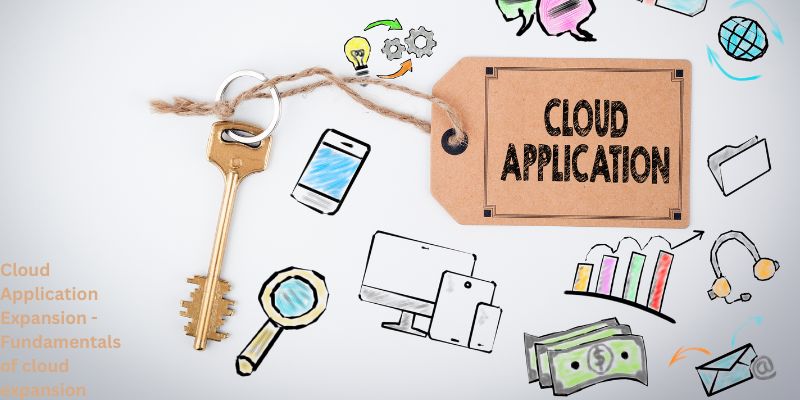Many people still don’t understand cloud apps, although statistics show that more than 50% of all business data is stored in the cloud. The obvious conclusion is that you must be familiar with cloud storage if you wish to build an app. In this article, with acameramen.com, let’s find out some useful technology information about cloud application expansion!
1. Cloud Application Expansion – Cloud-based software

Let’s consider what cloud-based apps are right now. These are programs that separate the functionality of a device’s data storage and processing into the client-side (which users can see and interact with) and the server-side (which is in charge of processing data). The following are some traits of cloud-based apps:
- A cloud infrastructure houses the data needed for the application. As a result, the hardware requirements for running the program have minimal requirements.
- Data storage is possible for the device. The option to have the program automatically updated while running offline is available when the device is back online.
- Any device with an Internet connection is capable of running the app for users. The user may keep working from wherever they are needed because all data is kept on the cloud.
Three types of cloud-based applications exist: SaaS, IaaS, and PaaS.
2. Cloud Application Expansion – What is the creation of cloud applications?

The process of developing a cloud-based software is known as cloud application development. It involves a number of software development phases, each of which gets your product ready for release and acceptance by the market. The best teams that create cloud applications leverage DevOps techniques and tools like Kubernetes. On the other side, a skilled cloud application development company should ideally be technology agnostic, meaning they should be able to construct your Cloud app utilizing whatever technology you prefer. The majority of Cloud-based applications rely significantly on the Cloud to run.
Cloud application development infrastructure enables web and PWA development services to lower development costs, open up the possibility of working with remote teams, and shorten project timeframes when used properly with software development methodologies like Agile. However, not many companies have the requisite expertise to manage several complex Cloud-based app development process components. Companies that want to create web-based Cloud apps or other digital goods should work with a respected app development company that has experience with the Cloud.
Even while some companies have in-house cloud application development teams, the majority will employ an app development company with cloud services expertise. Through certifications like AWS, you can easily confirm an app development company’s competence with the cloud.
3. Cloud Application Expansion – Fundamentals of cloud expansion

An increasing number of experimental products will be released by cloud providers to evaluate their value and product-market fit. These experimental solutions necessitate architectural choices that are simple for new businesses to embrace but difficult to adapt. ECS is a fantastic example of a company that explored the container market a number of years ago, had a shaky value proposition upon debut, but has now found its footing. A fantastic example of a current solution in this area is AWS Lambda, Azure Functions, and Google Functions.
The majority of these experimental ideas will ultimately evolve into something so widely adopted and commoditized that even many established businesses can use it. Today, it takes around three years to get from an experimental stage to a mature one.
The difficulty of prioritizing tiny possibilities will rise when the cloud providers themselves expand, including those prospects they presently offer becoming too small to justify maintaining.
Over time, cloud service providers will resolve any generalizable issue, despite its extreme difficulty, but they won’t resolve any specialized issues, despite their extreme simplicity. The good example of this is that AWS KMS offers hardware security modules, while the bad example is that Lambda still only supports a small number of languages. Warning: As your cloud spending increases, this idea becomes less clear because they’re quite prepared to complete specialized work for large consumers.
The majority of potential for development for cloud providers as cloud usage rises will come from persuading businesses to switch from their current cloud provider. Their priorities have been abruptly altered as a result of this:
- Reduce the cost of migration, especially by using common interfaces like the Kubernetes APIs, Envoy, etc.
- Offer the best value, particularly in terms of dependability, security, latency, and cost.
- Offer distinctive capabilities, like GCP’s machine learning strategy with Beam, to motivate internal supporters of the change.
Conclusion
The demand for cloud-based applications has significantly increased around the world. Numerous industry surveys state that the expansion of corporate mobile applications has led to serious performance and storage issues in over 70% of digital workplaces. The ideal way to manage such issues is via a cloud app.
Cloud apps are useful for businesses. Lower equipment and performance expenses are the outcome. Businesses have more room to grow thanks to the ease with which the company systems may be expanded on the clouds. As a result, the requirement for developing cloud applications has increased. As a result, during the past few years, the cloud computing business has been consolidating.
I hope you found this article about cloud application expansion useful. Have a good day!